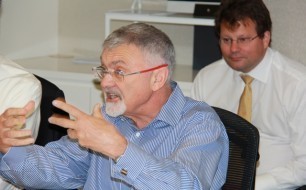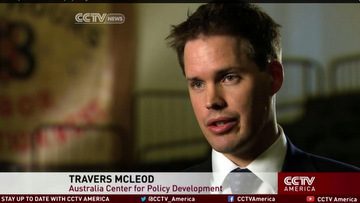Centre for Policy Development's Blog, page 48
January 26, 2015
In The Conversation, Kulkarni and McLeod discuss the economic potential of liberalising ideas | 23 January 2015
I n Prosperity or decline? Liberating ideas can reboot our economy Anand Kulkarni and Travers McLeod observe that Australia, in seeking to boost its economy, would be wise “to let ideas travel”. Liberating ideas and inculcating a collaborative culture would allow Australia to become a “global solutions hub”.
n Prosperity or decline? Liberating ideas can reboot our economy Anand Kulkarni and Travers McLeod observe that Australia, in seeking to boost its economy, would be wise “to let ideas travel”. Liberating ideas and inculcating a collaborative culture would allow Australia to become a “global solutions hub”.
Some of the ideas explored in the piece, which appears in The Conversation, include:
The need to overcome the limiting effect of information siloes, with a call to establish a National Collaboration Authority;
Developing new metrics, namely considering the “knowledge footprint” outside the Ivory Tower;
The need for Australia to more assertively use its “soft power” to “enlarge the space for winning ideas”.

The post In The Conversation, Kulkarni and McLeod discuss the economic potential of liberalising ideas | 23 January 2015 appeared first on CPD.
January 6, 2015
Sydney Morning Herald on false economies and the efficiency dividend | 2 January 2015

Gareth Hutchens discusses the efficiency of public service job cuts in Why this obsession with cutting public service jobs? , citing CPD’s False Eco n omies report with approval:
[It] will be a useful paper to revisit this year when we see yet another round of public sector job cuts.
If ever there was a false economy, it would be the imposition of regular compulsory redundancies in government departments and agencies.
Read Gareth Hutchens’s article on smh.com.au

The post Sydney Morning Herald on false economies and the efficiency dividend | 2 January 2015 appeared first on CPD.
Huffington Post on Beyond the Boats | December 2014
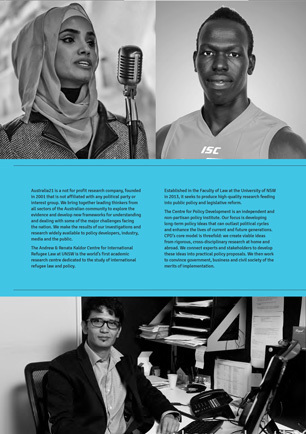 Travers McLeod is interviewed by Kyle Knight about Australia’s asylum seeker and refugee policy and CPD’s recent report Beyond the Boats, which recommended a regional Track II dialogue.
Travers McLeod is interviewed by Kyle Knight about Australia’s asylum seeker and refugee policy and CPD’s recent report Beyond the Boats, which recommended a regional Track II dialogue.“The fact that [Operation Sovereign Borders] has stopped the boats is a window of opportunity. It should be the start of a conversation not the end of it,” said Travers McLeod, chief executive officer at the Centre for Policy Development (CPD), an Australian think tank.”
Read Australia’s New Immigration Law Shifts Regional Focus to Security on huffingtonpost.com.
Read more about Beyond the Boats here.

The post Huffington Post on Beyond the Boats | December 2014 appeared first on CPD.
November 26, 2014
Beyond the boats: building an asylum and refugee policy for the long term | Report launch and media
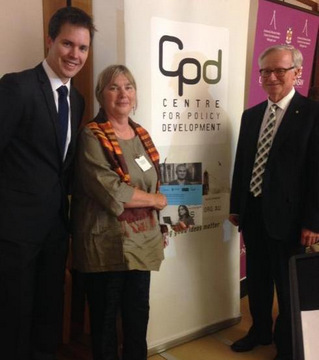
The Beyond the boats report stemmed from a high-level roundtable on asylum and refugee policy held at Parliament House in July under the auspices of the Centre for Policy Development, Australia21, and the Andrew & Renata Kaldor Centre for International Refugee Law at the University of New South Wales.
The report presents a nine-point framework that focused on managing arrivals, conditions and treatment, and regional and community engagement. The report suggested strategies for the short-term, such as expanding pathways for humanitarian settlement, as well as long-term strategies, such as the regional Track II dialogues.
Here are some examples about what has been said about the report so far.
Print:
Sarah Whyte, in the Fairfax press, stated that “Beyond the Boats: building an asylum and refugee policy for the long term, is one of the most significant bipartisan documents about the government’s asylum seeker policy to be released this year, as the
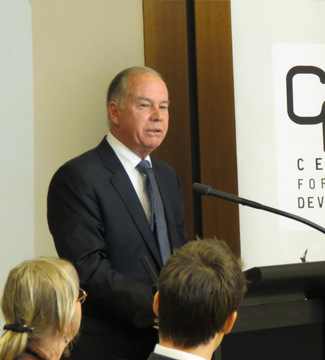 migration of displaced people around the world continues to escalate to numbers not seen since World War II.”
migration of displaced people around the world continues to escalate to numbers not seen since World War II.”Bob Douglas, CEO of Australia21, expressed that “we need as a nation to take a deep breath and and ask what next? Where does and will Australia stand in responding to the ongoing global displacement of people from they homes – the biggest such movement since World War II with 51 million people now adrift from their homes?”
Shalailah Medhora, in Guardian Australia, quoted Travers McLeod: “We have a window of opportunity because the boats have stopped. So now there’s an opportunity for long-term policy advancement.”
Alexandra Kirk, on ABC Online, quoted Fred Chaney: “You can’t keep recycling that. If the boats stop coming, will the problem go away? No, it won’t because our neighbours are going to have continuing problems, we’re going to have continuing problems as a country dealing with what is an international issue.”
SBS News stated that the report “calls for a fresh approach to a long-term immigration policy. It will outline ways to deal with managing asylum seeker arrivals and the country’s regional engagement, calling for swift determination of claims, stronger work rights, and a transition away from mandatory detention.”
Jake Flanagin, in the New York Times Opinion blog, told readers: “In another piece for The Sydney Morning Herald, the paper’s immigration correspondent, Sarah Whyte, highlights a new report which calls for a ‘long term policy to handle immigration.'”
The Gladstone Observer “An end to mandatory detention of asylum seekers, expansion of Australia’s refugee resettlement program and other initiatives are essential to forming a long-term solution to people smuggling, a landmark report has urged.
Radio: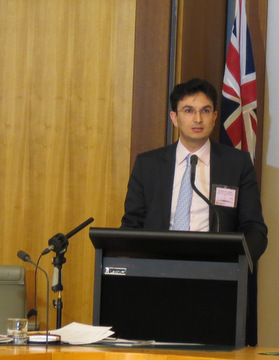
Fred Chaney spoke to Alison Carabine on ABC Radio National. Fred told the program: “The incentive is to work within the system. The problem is the system is one which doesn’t serve many people who have got genuine refugee status and that’s why we’ve got to do much more internationally and indeed increasing our own intake would be a sign of bona fides to these countries that we need to cooperate with for us to have a successful, controlled immigration, including refugees, approach.”
Paris Aristotle, CEO of Foundation House, Fred Chaney and Wiryono Sastrohandoyo, former Indonesia Ambassador to Australia, spoke with Alexandra Kirk on Radio National AM. Paris told the program: “There are no complete solutions to this issue. There will only be better ways of managing them. What I would like to see happen is for the entrenched positions that people have held for so long to be broken down and for people to come into a dialogue process that allows us to discuss all of the issues and provide credible, viable and long-lasting strategies for managing this issue better.”
Jessica Ball from The Wire interviewed Travers McLeod and Professor Munjed Al Muderis, refugee and orthopaedic surgeon. Travers said “One thing
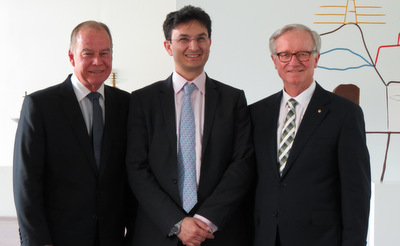 that is clear is the danger of looking at this purely from a domestic vantage point. Over 30% refugees are in the Asia-Pacific region. The numbers are growing not receding. We need a trusting, respectful, often off the record conversation between official in government, outside of government with key source destination and transit countries. So building that track 2 dialogue, which we say has been missing on forced migration in this region is absolutely essential.”
that is clear is the danger of looking at this purely from a domestic vantage point. Over 30% refugees are in the Asia-Pacific region. The numbers are growing not receding. We need a trusting, respectful, often off the record conversation between official in government, outside of government with key source destination and transit countries. So building that track 2 dialogue, which we say has been missing on forced migration in this region is absolutely essential.”Patrick Condren from 4BC Mornings spoke to Bob Douglas, CEO of Australia21. Bob Douglas expressed that “[The government] has, I think, stopped the boats, but it hasn’t done anything to deal with the refugee problem around the world and that’s the question we think Australians have to start talking about and the Abbott Government hasn’t started talking about it.”
Peggy Giakoumelos & Sacha Payne from SBS World News interviewed Arja Keski-Nummi and Munjed Al Muderis. Arja Keski-Nummi stated “It’s been blow up into an issue much larger than it actually is. And I think we need to get some of the hear out of the conversation and have a conversation about the needs of people who are seeking asylum, what the issues are and how they are actually being processed in Australia. It just, I think, gives people a confidence that this isn’t a big problem, as has been portrayed.”
Television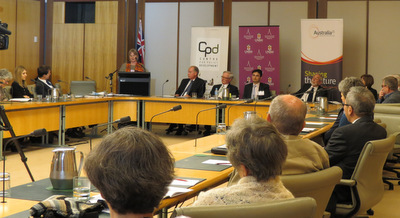
Hon Fred Chaney appeared on Sky News Agenda with host David Speers. Fred spoke about the potential benefits of a Track II dialogue: “We’re suggesting an approach called a track two approach. Which means that there is a lot of work done outside of the political sphere. Sure politicians take part in it, but so do public servants, military people, intelligence people, industry people to start providing a framework of understanding within which you can do things together. I think that sort of thing has been proven to work out in other areas, it can work here.”
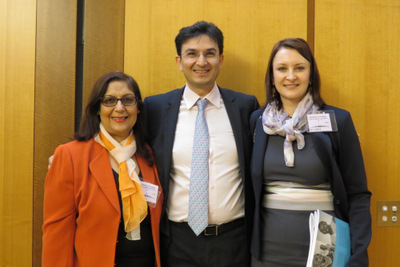
Download the ‘Beyond the boats’ report
Read about the high-level roundtable

The post Beyond the boats: building an asylum and refugee policy for the long term | Report launch and media appeared first on CPD.
November 25, 2014
Gus O’Donnell roundtable: Good policy needs compelling storytellers
CPD was delighted to host Sir Gus O’Donnell, former British Cabinet Secretary, head of British civil service and, for four years, Press Secretary to PM John Major, on 13 November 2014 for a workshop at Cisco in Melbourne to discuss how polling intersects with long-term policy development. The workshop, held under the Chatham House Rule, drew together industry leaders, consultants, public sector representatives, policymakers and researchers. The workshop was made possible through sponsorship from Telstra, Deloitte and Cisco.
Beginning with insights from Gus O’Donnell based on his experience working for four British Prime Ministers, the workshop heard reactions from Professor Peter Shergold (Secretary of the Department of Prime Minister and Cabinet from 2003-2008), Tony Douglas (Founder and Director of Essential Media Communications) and Clare O’Neil MP (Member for Hotham). All workshop participants then shared and debated insights in open dialogue.
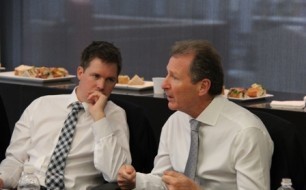 One of the consistent themes was the importance of storytelling in policymaking, both for public servants and politicians. Narratives must be logical and coherent. Polling, where used, should be used carefully. Questions should be constructed in a way that does not bias answers. Polling should inform policy design early, rather than necessitate dramatic late changes as part of a messaging strategy. There was a lively debate about differences between the current media and political cycles today as opposed to previous decades, and what effects or constraints this may have on leadership styles and, ultimately, policymaking. Views differed on the extent to which policymakers should be ahead of, or respond to, public opinion.
One of the consistent themes was the importance of storytelling in policymaking, both for public servants and politicians. Narratives must be logical and coherent. Polling, where used, should be used carefully. Questions should be constructed in a way that does not bias answers. Polling should inform policy design early, rather than necessitate dramatic late changes as part of a messaging strategy. There was a lively debate about differences between the current media and political cycles today as opposed to previous decades, and what effects or constraints this may have on leadership styles and, ultimately, policymaking. Views differed on the extent to which policymakers should be ahead of, or respond to, public opinion.
Other issues discussed included:
• The importance of data in preparing evidence-based policy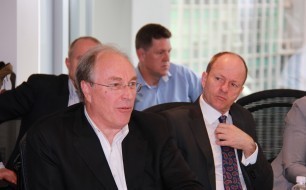
• Understanding voter identification and how it impacts behaviour
• Risk perception, and preparing the electorate for reform
• Public expectations, and the balance between promises and delivery
• Trust in political leaders
Participants expressed optimism for how new polling methods and technologies might draw members of the public closer to the policy making process. Polling used for this purpose can help to unpack complex policy problems and explore ways of responding to them, rather than being used in a reactionary way to capture static perceptions of particular issues or language chosen to ‘sell’ policy. Polling will always be used to sample public opinion and voting intention. It can also be used more effectively to explain difficult policy problems and probe pathways for overcoming them. Leaders need not always follow the polls. Leaders must also, on occasion, use the opportunity polling presents to enhance awareness and advance an alternative, perhaps unpopular, view. This can be a dynamic and productive process, if done over a longer term period and appropriately insulated from short-term media cycles.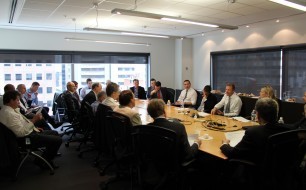
CPD thanks all participants for their attendance and contributions to an excellent discussion. Roundtables such as these are part of CPD’s drive to bring experts and diverse stakeholders together to advance key policy debates.
Photos: Clockwise (from top) Prof Peter Shergold (foreground), (from right) Sir Gus O’Donnell and Travers McLeod, Tony Douglas (foreground), Roundtable participants.

The post Gus O’Donnell roundtable: Good policy needs compelling storytellers appeared first on CPD.
Book launch – Northern Lights
Monash University Publishing
Hosted by UTS Business School
Join us at 12.30pm on Wednesday 3 December for the book launch of Northern Lights: The Positive Policy Example of Sweden, Finland, Denmark and Norway, by Dr Andrew Scott of Deakin University, Melbourne.
When: 3 December 2014 | 12:30 pm – 2:00 pm
Where: Palm Court, Building 5, Block C, UTS, Ultimo, NSW
RSVP: To register to attend please email: business@uts.edu.au
The nations of Nordic Europe continue to provide living proof that economic prosperity can be combined with social equality and environmental responsibility. Dr Scott will discuss his book, written from an Australian perspective, that explores previous outside policy interest in the Nordic nations and will outline some lessons which the English-speaking world, in particular, can learn now from the achievements of the four main Nordic European nations.
Dr Scott will be discussing his book with Dean of UTS Business School, Professor Roy Green along with senior lecturer, Dr Natalia Nikolova and CEO of The Centre for Policy Development, Travers McLeod.
An extract of Northern Lights was published by The Mandarin, link available here http://www.themandarin.com.au/9290-policy-sweden-november-26-run/

The post Book launch – Northern Lights appeared first on CPD.
November 24, 2014
The Wire | 19 November 2014
Centre for Policy Development CEO, Travers McLeod, joins Shannon Kilgariff on The Wire to discuss the government’s recent decision to deny refugees who have applied for UNHCR status in Indonesia resettlement in Australia after 1 July 2014. Travers told The Wire:
What it also does though, which is problematic, is to rule out Australia as a resettlement option for those refugees that try do so through the UNHCR, through that orderly and managed process. And I think that there are grounds to be concerned by ruling that out as an option or ruling Australia out as a resettlement option by people that are following those correct processes within Indonesia. What it will mean is that it will shift the burden to other countries in the region to be resettlement options.
The Wire was also joined by Paul Power, CEO of Refugee Council Australia, and Scott Morrison, the Minister for Immigration and Border Protection. The interview continues CPDs strong support for a long-term and overarching asylum and refugee policy system. Earlier this month CPD, Australia21 and the Andrew & Renata Kaldor Centre for International Refugee Law launched “Beyond the boats”, a report that outlines a nine-point framework for a future asylum policy.
You can listen to The Wire story here.
Find the Beyond the boats report here.
DONATE to help CPD insert real evidence & expertise into Australian policy debates!

The post The Wire | 19 November 2014 appeared first on CPD.
November 16, 2014
CCTV America | 13 November 2014
In the lead up to the weekend’s G20 Leaders’ Summit, Travers McLeod spoke to China Central Television America about Australia’s role in combating global climate change.
“The reality is that Australia has been leap-frogged by many other G20 countries in counteracting climate change. We’ve fallen behind the pack, and in many respects are moving away from the pack so far as the overall trajectory of the global economy is concerned.”
Travers comments foreshadowed the US-China agreement on carbon emissions. The agreement will see the United States reduce emissions by 26%-28% below its 2005 level in 2025. China intends to achieve the peaking of carbon emissions around 2030. Both sides intend to continue to work to increase ambition over time.
The CCTV segment can be viewed here.
 DONATE to help CPD insert real evidence & expertise into Australian policy debates!
DONATE to help CPD insert real evidence & expertise into Australian policy debates!

The post CCTV America | 13 November 2014 appeared first on CPD.
November 4, 2014
The Sydney Morning Herald | 5 November 2014
 Australia needs long term policy to handle immigration, says major new report
Australia needs long term policy to handle immigration, says major new reportSarah Whyte talks to Paris Aristotle about Beyond the boats
The Abbott government may have claimed victory in stopping the boats, but that should only be the beginning of Australia’s response to the long-term humanitarian crisis of displaced people, a major report into the country’s asylum seeker policy has warned.
Read Sarah Whyte on Beyond the boats on smh.com.au
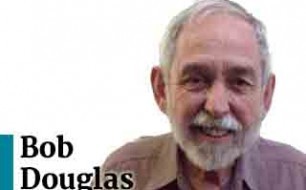
Now we’ve stopped the boats, what next?
Bob Douglas from Australia21 offers expert commentary on asylum and refugee policy for the long term
By falsely labelling boat people “queue jumpers”, “illegals” and “economic migrants” and by claiming humanitarian success in preventing deaths at sea, our political leaders on both sides have neatly sidestepped the real problem, which is not going away and will be much worse before it is better.
Read Bob Douglas’s commentary on smh.com.au
Read more about Beyond the boats – launched in Parliament House, Canberra, 5 November 2014

The post The Sydney Morning Herald | 5 November 2014 appeared first on CPD.
Beyond the boats: building an asylum and refugee policy for the long term | LANDMARK REPORT
 Report from a high level roundtable on asylum and refugee policy convened by CPD, Australia21 and the Andrew and Renata Kaldor Centre for International Refugee Law (UNSW)
Report from a high level roundtable on asylum and refugee policy convened by CPD, Australia21 and the Andrew and Renata Kaldor Centre for International Refugee Law (UNSW)Now that the acute phase of boat arrivals appears over, Beyond the boats urges all parties to use this opportunity to construct an overarching national asylum and refugee policy for the long term.
Key recommendations include increasing Australia’s humanitarian intake, phasing out mandatory detention apart from initial screening and establishing a regional Track II dialogue.
The nine-point framework presented focuses on managing arrivals, conditions and treatment, and regional and community engagement. To make an immediate and appreciable difference the report recommends expanding pathways for humanitarian settlement, such as through orderly departure arrangements, swift determination of claims and improved conditions including work rights. A regional Track II dialogue on forced migration is also proposed to help officials to look beyond electoral cycles.
The recommendations recognise the broad framework of existing refugee policy commands cross party support, but seeks to build on this to provide a more constructive and humane way forward that is consistent with Australian values.
Launch by the Hon Fred Chaney AO, Senior Australian of the Year, Parliament House, Canberra, 5 November (2pm)
Welcome and Introduction from event chair, Ms Arja Keski-Nummi PSM
Launch of Beyond the boats by the Hon Fred Chaney AO (Roundtable Participant), addressing the report and its recommendations
Mr Russell Broadbent MP (Parliamentary Host), commenting on the report and its recommendations
Associate Professor Munjed Al Muderis to offer personal reflections on asylum policy and the need for a new national conversation
Panel and authors will take questions from media and invited guests.
Cross-party support:
Liberal MP Russell Broadbent: “(this) report is a new opportunity” for a bipartisan approach to asylum policy”
Greens MP Adam Bandt: “It’s clear that we have the ideas to make Australian immigration policy something that we can be proud of. Now it’s time for all political leaders to have the courage to implement fair policies that treat asylum seekers and refugees with the respect and compassion that they deserve.”
Labor Senator Sam Dastyari: “The July Roundtable discussion was a bold and innovative effort to re-start a mature discussion on asylum seekers; a discussion that must respect the broad views of Australians and the deeply divisive nature of the debate in order to progress. Both sides of this divide are only too willing to express their anger and outrage, but few are prepared to step into the breach to look for reasonable policy solutions.”
Speakers:
The Hon Fred Chaney AO
Fred Chaney was a lawyer and a politician from 1974 to 1993. He served in the Fraser Government including as Minister for Aboriginal Affairs. His connection with refugee issues has been through his wife’s direct work with refugees in the community and he has been a sometime advocate for refugee interests. Mr Chaney was made Senior Australian of the Year in 2014 in recognition of his commitment to reconciliation and human rights. His hard work in support of often marginalised people has never faltered. Mr Chaney was founding co-chair of Reconciliation Australia, helped to establish the Aboriginal Legal Service of Western Australia, and was Deputy President of the National Native Title Tribunal for many years. His long history of public service is rooted in his fierce commitment to social justice and a belief in the inherent equality of people. In all his leadership roles, Mr Chaney inspires others to work collaboratively, respectfully and ambitiously to overcome the barriers that inhibit people’s full economic and social participation in Australian society.
Russell Broadbent MP
Russell Broadbent has been the Federal Member for McMillan since 2004. He previously held the seat of McMillan from 1996-1998 and was the Federal Member for Corinella from 1990-1993. Russell has lived in the McMillan electorate all of his life. He was born in Koo Wee Rup, and lives in Pakenham with his wife, Bronwyn. They have three adult children. Mr Broadbent has played a pivotal role in acquiring drought relief for farmers in Gippsland, securing the mobility payment for people with disabilities and giving assistance to small businesses in the region. Mr Broadbent has been a strong advocate for asylum seekers and refugees, which has included a call to remove all women and children from detention.
Associate Professor Munjed Al Muderis MB ChB FRACS, FAOrthA
Munjed Al Muderis is an orthopaedic surgeon. He is an Adjunct Clinical Associate Professor in the School of Medicine, Sydney Campus at the University of Notre Dame Australia and a clinical lecturer at Macquarie University and The Australian School Of Advanced Medicine. Prof. Al Muderis specialises in Hip, Knee and Trauma surgery. He is a fellow of the Royal Australasian College of Surgeons and Chairman of the Osseointegration Group of Australia. Prof. Al Muderis is a former refugee, who fled Iraq after refusing the orders of the Saddam Hussein regime to surgically remove the ears of soldiers who had escaped from the Iraqi army. He travelled to Australia on a wooden boat in 1999 and claimed asylum.
Ms Arja Keski-Nummi PSM
Arja Keski-Nummi had a career with the Department of Immigration and Citizenship spanning more than three decades, and was First Assistant Secretary of the Refugee, Humanitarian and International Division from 2007 – 2010. Her responsibilities included high level policy and reform of all aspects of Australia’s refugee and humanitarian program. Ms Keski-Nummi has played a key role in the development of Australia’s settlement and integration policies for humanitarian entrants as well as being involved in direct delivery of services to refugees and migrants. From 1987-1993 she worked in Senior Adviser positions to immigration ministers in the Hawke and Keating Governments, including to Mick Young and Gerry Hand. In 2010, Ms Keski-Nummi received the Public Service Medal for her work delivering Australia’s Humanitarian Program. Together her former colleague, Peter Hughes PSM, she co authored the discussion paper that informed the July 2014 roundtable.
Download ‘Beyond the boats’ report
Read about the high-level roundtable

Donate to CPD
DONATE to help CPD insert real evidence & expertise into Australian policy debates!

The post Beyond the boats: building an asylum and refugee policy for the long term | LANDMARK REPORT appeared first on CPD.
Centre for Policy Development's Blog
- Centre for Policy Development's profile
- 1 follower


